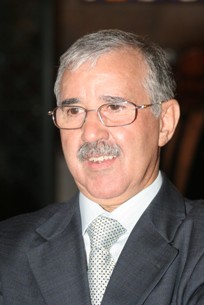CCDH PARTICIPATES IN A MEETING ON MIGRATION AND HUMAN TRAFFICKING IN JORDAN
The Advisory Council on Human Rights (CCDH), represented by member M’barek Bouderka, participated in a meeting on migration and human trafficking organized within the framework of the Arab-European Human Rights Dialogue from 24 to 26 November 2010 in Amman (Jordan).
During this meeting, Mr. Bouderka gave a presentation on the achievements made so far in terms of trafficking in migrants and women and child migrants. He defined the problems and challenges and the support that can be provided by the Working Group on Migration in this regard.
Mr. Bouderka indicated that the Council elaborated a draft study in the field to address and analyze the size of the phenomenon. The study was drafted after a process of consultation with all stakeholders concerned, in order to define the institutional and legal gaps in light of the international human rights standards and make the relevant recommendations. He highlighted that the Council is preparing an advisory opinion in the field.
“CCDH follows up closely the work being conducted by a ministerial committee in charge of drafting a law on refugees. The objective is to make its own advisory opinion from the perspective of human rights on the basis of the compared studies, experiences and good practices in the field. This opinion will take into account the international human rights standards in order to set up a national institution in charge of refugees”, he declared.
The Council organized a regional seminar on “The protection of refugees: international law and national mechanisms”, in cooperation with the High Commissioner for Refugees. The seminar aimed to continue reflection and deepen discussion on issues related to refugees and their protection in Morocco and to continue dialogue among public authorities, civil society actors, researchers and international organizations working in the field.
Mr. Bouderka underlined that Morocco is no longer a country of origin and transit. It has rather become a hosting country. This new situation gives rise to many challenges pertaining to the establishment of reception structures in conformity with Morocco’s human rights commitments.
The security approach adopted by European states creates human rights challenges and problems for the states of transit and origin. In addition, the financial and technical potentials of the countries of origin and transit are not sufficient enough to control borders and combat human trafficking. Besides, the states of the Arab-Euro Human Rights Dialogue are slow to accede to the International Convention on the Protection of the Rights of All Migrant Workers and Their Family Members, in addition to their very limited coordination.
Mr. Bouderka stressed the necessity of reinforcing the capacities of local actors in the field of migration, conducting advocacy to push European countries to ratify the International Convention on the Protection of the Rights of All Migrant Workers and their Family Members, encouraging the Dialogue States to conclude bilateral conventions to ensure the implementation of the rights of migrants and assisting in conducting studies and researches on migration, refuge and human trafficking.






















